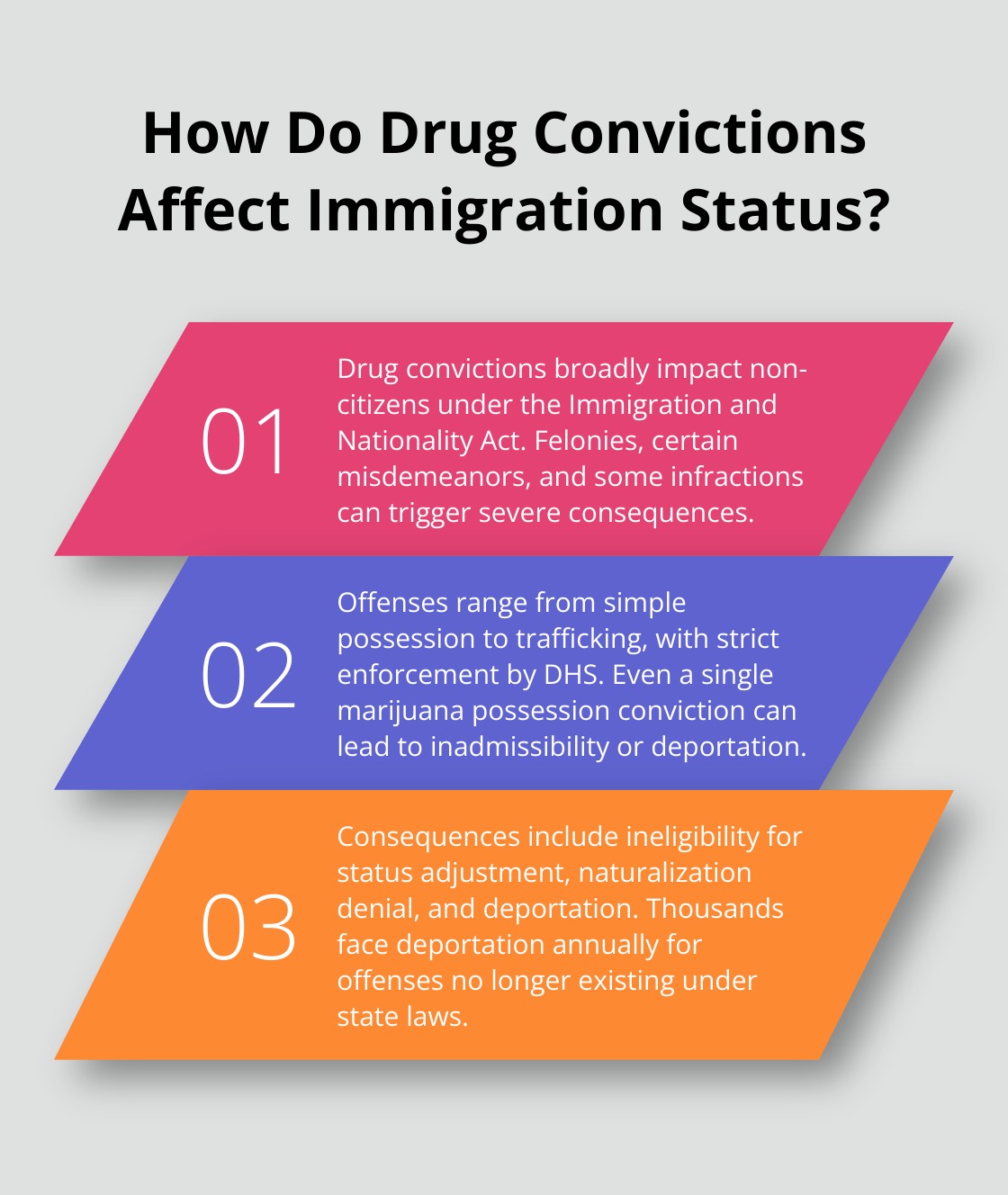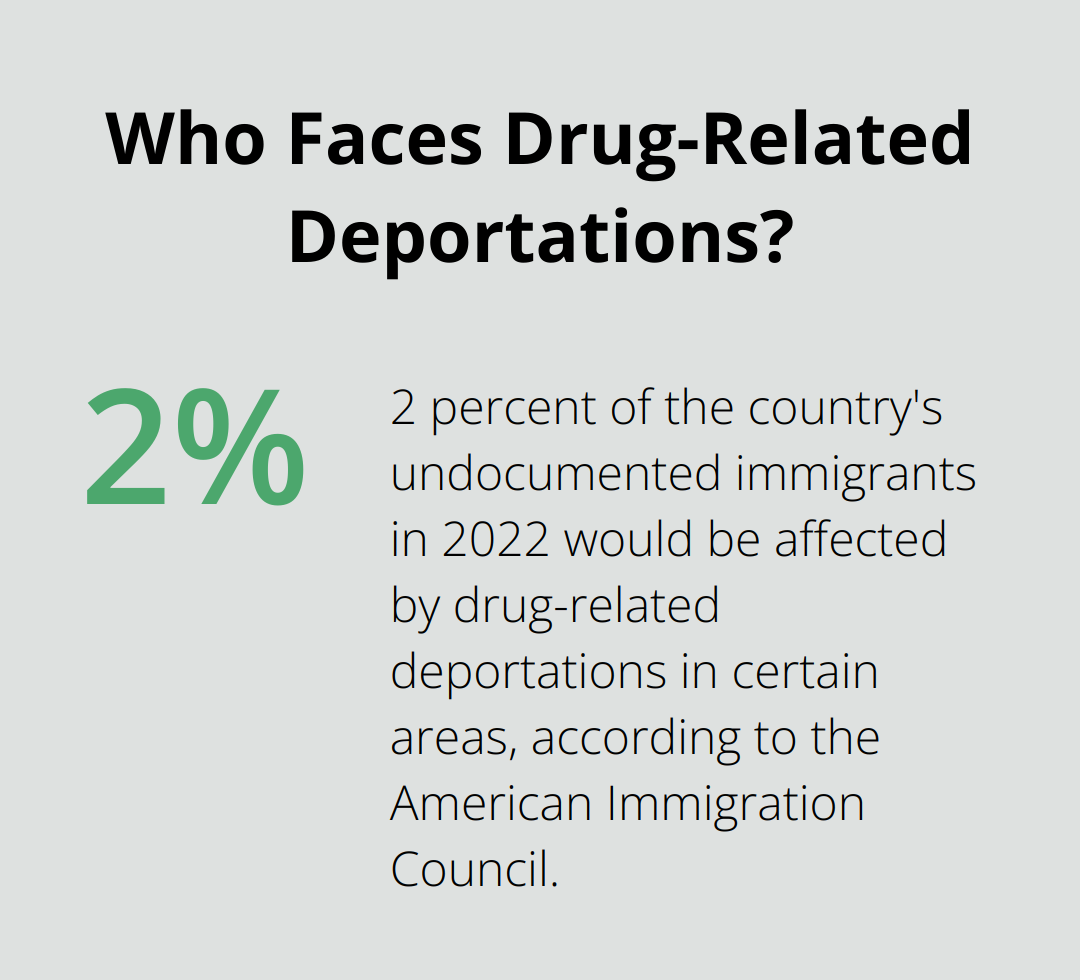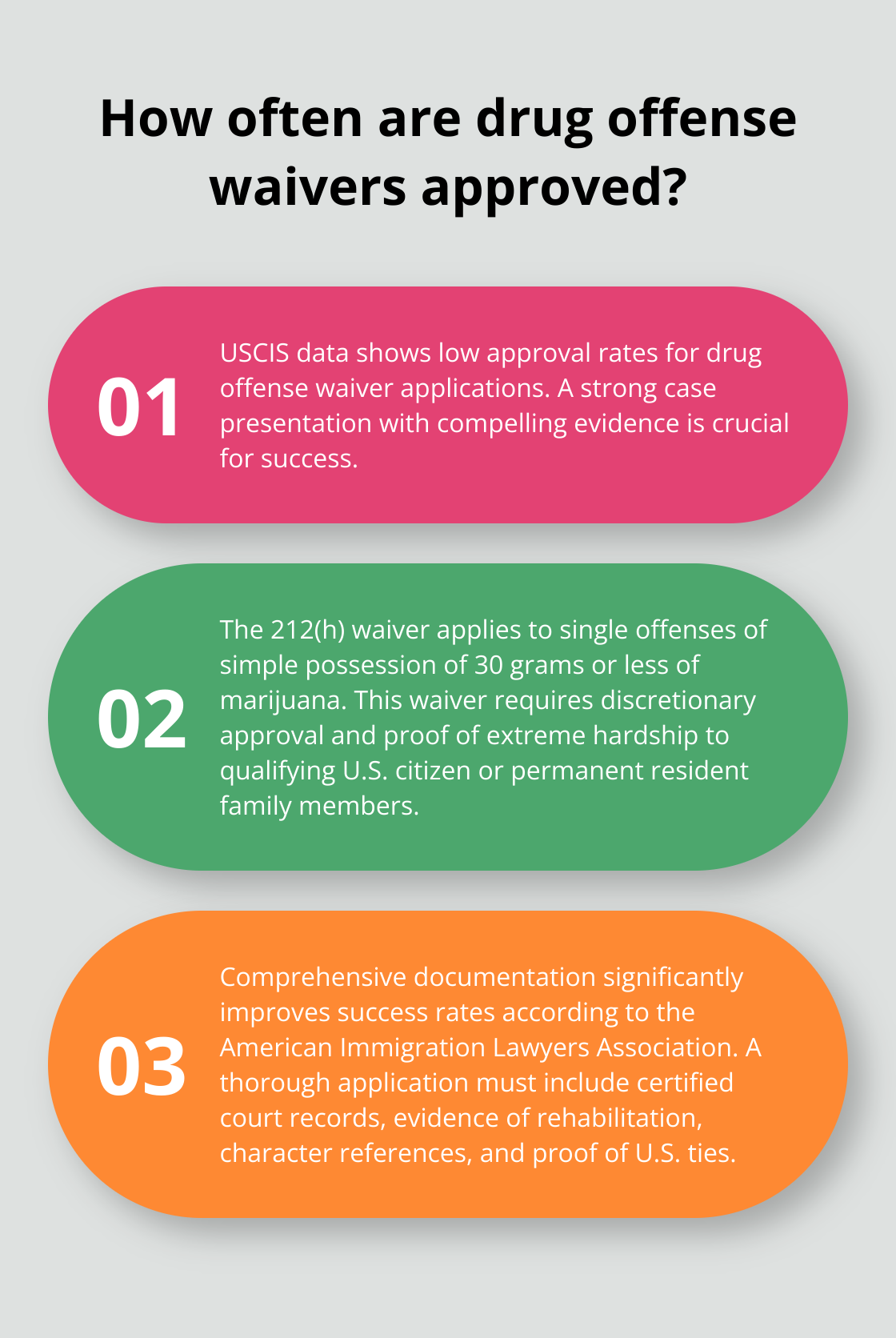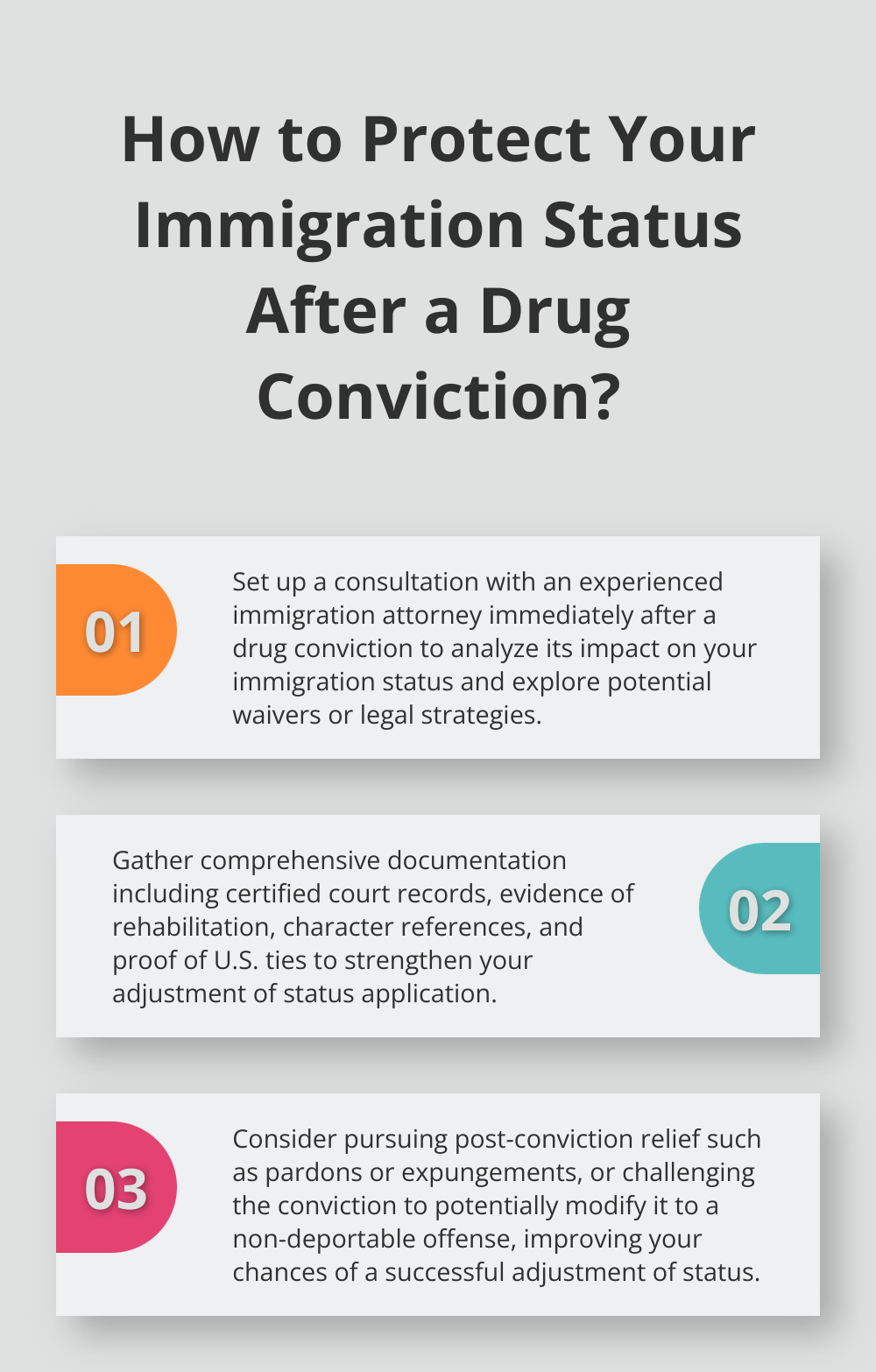
Drug Convictions and Adjustment of Status: What to Know
Drug convictions can have severe consequences for individuals seeking to adjust their immigration status in the United States. At Law Offices of Jeffrey A. Thompson, we often encounter cases where clients face challenges due to past drug-related offenses.
Understanding the impact of an adjustment of status drug conviction is crucial for anyone navigating the complex immigration system. This blog post will explore the intersection of drug convictions and immigration law, providing essential information for those affected by these issues.
What Are Drug Convictions in Immigration Law?
Definition and Scope
Drug convictions in immigration law represent a complex area with severe consequences for non-citizens. The Immigration and Nationality Act (INA) defines these convictions broadly, including felony offenses, certain misdemeanors, and even some drug-related infractions. This wide-ranging definition underscores the importance of understanding the potential impact on one’s immigration status.
Types of Drug Offenses Affecting Immigration Status
The spectrum of drug offenses that can impact immigration status is extensive. It spans from simple possession to trafficking. Even a single conviction for possessing a small amount of marijuana can trigger immigration consequences. The Department of Homeland Security takes a particularly strict approach to controlled substance violations, often treating them as grounds for inadmissibility or deportation.
Thousands of people are being deported every year for drug offenses that in many cases no longer exist under state laws, harming and separating immigrant families.
Consequences for Non-Citizens
The repercussions of a drug conviction for non-citizens can be far-reaching. These may include:
- Ineligibility for adjustment of status
- Denial of naturalization
- Mandatory detention
- Deportation proceedings
Even lawful permanent residents (green card holders) are not immune to these consequences. A criminal charge can lead to the immediate revocation of a visa, effectively stripping the individual of their lawful status.
The Importance of Legal Counsel
The complexity of immigration law and the severe consequences of drug convictions make expert legal counsel not just advisable, but essential. An experienced immigration attorney can provide valuable assistance in several ways:
- Analyzing the specific drug offense and its potential immigration impact
- Exploring possible defenses or waivers
- Negotiating with prosecutors to avoid immigration consequences
- Representing clients in immigration court proceedings

As we move forward to discuss the specific impact of drug convictions on adjustment of status, it’s clear that understanding these convictions in the context of immigration law is vital for anyone facing these issues. The consequences can alter lives, but with proper legal guidance, options may exist to mitigate the impact on one’s immigration status.
How Drug Convictions Impact Adjustment of Status
Eligibility Challenges for Adjustment of Status
Drug convictions create significant barriers in the immigration process, often rendering applicants ineligible for adjustment of status. The Immigration and Nationality Act (INA) takes a strict stance on controlled substance violations. An undocumented person who is inadmissible because of a drug conviction or drug conduct grounds is barred from applying for many types of relief or lawful status.

The American Immigration Council reports that drug-related offenses account for a substantial portion of deportations. As of October 1, 2024, in certain areas, 2 percent of the country’s undocumented immigrants in 2022 would be affected, and one in every 20 residents would be deported.
Consequences for Different Immigration Statuses
Lawful Permanent Residents (LPRs)
For LPRs, a drug conviction can initiate removal proceedings, regardless of their length of residence in the U.S. The stability they’ve built over years can crumble due to a single offense.
Non-Immigrants
Those on student or work visas face immediate visa revocation and potential deportation upon conviction. Their dreams and aspirations in the U.S. can come to an abrupt end.
The ripple effects extend beyond individuals. Families face separation, and communities experience disruption.
Grounds for Inadmissibility and Deportation
Drug convictions often serve as grounds for both inadmissibility and deportation. The INA lists various drug-related offenses that can trigger these consequences:
- Possession of controlled substances
- Drug trafficking (or intent to traffic)
- Conspiracy to commit drug-related crimes
It’s important to note that even expunged or pardoned convictions may still have immigration consequences. The immigration system often considers these offenses regardless of their treatment under state law.
The Importance of Expert Legal Counsel
Each case presents unique challenges, and the consequences can vary based on factors such as the type of drug involved, the amount, and the specific charge. Seeking expert legal counsel becomes not just advisable-but essential for protecting rights and exploring all available options.
The Law Offices of Jeffrey A. Thompson in Brockton, Massachusetts, specializes in immigration law and can provide the necessary guidance to navigate these complex situations. With their expertise, individuals facing drug-related immigration issues can explore potential waivers, legal strategies, and paths forward in their immigration journey.
As we move forward, we’ll explore the specific strategies and options available for those navigating the adjustment of status process with a drug conviction on their record.
Overcoming Drug Conviction Hurdles in Adjustment of Status
Understanding Waivers and Exceptions
The Immigration and Nationality Act offers limited relief for certain drug offenses. The 212(h) waiver applies to single offenses of simple possession of 30 grams or less of marijuana. These waivers require discretionary approval and proof of extreme hardship to qualifying U.S. citizen or permanent resident family members.

U.S. Citizenship and Immigration Services (USCIS) data reveals a low approval rate for waiver applications. This statistic emphasizes the need for a robust case presentation with compelling evidence.
Crafting a Strong Application
A thorough application for adjustment of status with a drug conviction must include:
- Certified court records of the conviction
- Evidence of rehabilitation (e.g., completion of drug treatment programs)
- Character references from employers, community leaders, and family members
- Proof of U.S. ties and community contributions
The American Immigration Lawyers Association reports that comprehensive documentation significantly improves success rates.
Effective Legal Strategies
To address immigration hurdles due to drug convictions, consider these approaches:
- Challenge the conviction: Explore options to vacate or modify the conviction to a non-deportable offense.
- Seek post-conviction relief: Pursue pardons or expungements to mitigate immigration consequences.
- Argue for favorable discretion: Demonstrate exceptional circumstances or significant rehabilitation to influence decision-makers.
Executive Office for Immigration Review statistics indicate that individuals with attorney representation are more likely to win their cases compared to those without legal representation.
The Role of Expert Legal Counsel
The complexity of drug-related immigration cases necessitates expert legal guidance. An experienced immigration attorney can:
- Analyze the specific drug offense and its potential immigration impact
- Explore possible defenses or waivers
- Negotiate with prosecutors to avoid immigration consequences
- Represent clients in immigration court proceedings
The Law Offices of Jeffrey A. Thompson in Brockton, Massachusetts, specializes in immigration law and provides necessary guidance for these complex situations. Their expertise helps individuals facing drug-related immigration issues explore potential waivers, legal strategies, and paths forward in their immigration journey.
Final Thoughts
Drug convictions significantly impact the adjustment of status process, creating substantial obstacles for individuals seeking to establish or maintain their immigration status in the United States. The consequences of an adjustment of status drug conviction can be severe, but they are not insurmountable with the right approach and expert legal support. Professional legal assistance plays a vital role in navigating these complex cases, offering invaluable insights and tailored strategies to protect clients’ rights and interests.

At the Law Offices of Jeffrey A. Thompson, we specialize in guiding clients through challenging situations related to drug convictions and immigration issues. Our experienced team works diligently to explore all available options, including waivers, conviction challenges, and demonstrations of exceptional circumstances or rehabilitation. We understand the unique nature of each case and strive to develop effective strategies that address the specific needs and circumstances of our clients.
Numerous resources from reputable immigration advocacy organizations and government agencies can provide additional context and guidance for those seeking further information. These resources should complement, not replace, personalized legal advice (which is essential for navigating the intricate landscape of immigration law). With expert legal support and a thorough understanding of both immigration law and individual case specifics, it becomes possible to work towards a positive resolution in even the most challenging adjustment of status cases involving drug convictions.


